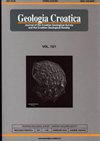中中新世海相洪水:北克罗埃西亚盆地凝灰岩综合生物地层的新40Ar/39Ar年龄约束
IF 1.1
4区 地球科学
Q3 GEOLOGY
引用次数: 8
摘要
在位于潘诺尼亚盆地系统西南部的北克罗地亚盆地,在Banovina、Medvednica山和Slavonia地区的几个地方发现了中新世凝灰岩矿床。在这里,我们介绍了从火山玻璃中获得的新的40Ar/39Ar年龄结果,这些火山玻璃来自Laz凝灰岩(15.42±0.15Ma)和Jovac凝灰岩(15.10±0.06Ma),它们都沉积在海洋环境中,Laz凝灰岩夹有湖泊淡水/半咸水沉积物,Jovac凝灰岩夹有湖相淡水沉积物,Čučerje凝灰岩(14.81±0.08Ma)和Nježić凝灰岩(14.40±0.03Ma)。Čučerje和Nježić凝灰岩下层和上层的化石数据(钙质超微化石/有孔虫)与地质年代数据相匹配,即确定了NN5带和M6带。生物地层学和地质年代数据的整合使我们能够更好地了解国家编目局的沉积演化,并限制国家编目局西部边缘地区约15 Ma的中新世中期海洋洪水事件,即巴登尼亚早期/中期边界。这些结果以及Sava凹陷(位于NCB南部)中下巴登尼亚海洋沉积物的存在表明,可以得出结论,在NCB中的巴登尼亚早期,淡水湖泊和海洋环境共存。本文章由计算机程序翻译,如有差异,请以英文原文为准。
Middle Miocene marine flooding: New 40Ar/39Ar age constraints with integrated biostratigraphy on tuffs from the North Croatian Basin
In the North Croatian Basin which is located in the southwestern part of the Pannonian Basin System, Miocene tuff deposits have been observed at several localities in the area of Banovina, Medvednica Mt. and Slavonia. Here we present new 40Ar/39Ar age results obtained from volcanic glass from the Laz tuff (15.42 ± 0.15 Ma) intercalated with lacustrine freshwater/brackish deposits, the Jovac tuff (15.10 ± 0.06 Ma) intercalated with lacustrine freshwater deposits, the Čučerje tuff (14.81 ± 0.08 Ma) and the Nježić tuff (14.40 ± 0.03 Ma) both deposited in a marine environment. Fossil data (calcareous nannofossils/foraminifera) from the underlying and overlying beds of the tuffs from Čučerje and Nježić match the geochronological data i.e. NN5 zone and M6 zone were determined. Integration of biostratigraphic and geochronological data enable a better understanding of the NCB sedimentary evolution and constrain the Middle Miocene marine flooding event in the marginal areas of the western part of the NCB at ~15 Ma i.e. early/middle Badenian boundary. These results together with the existence of lower Badenian marine sediments in the Sava depression (in the southern part of NCB) suggest it is possible to conclude that during the early Badenian in the NCB, freshwater lacustrine and marine environments coexisted.
求助全文
通过发布文献求助,成功后即可免费获取论文全文。
去求助
来源期刊

Geologia Croatica
GEOSCIENCES, MULTIDISCIPLINARY-
CiteScore
2.90
自引率
23.10%
发文量
35
审稿时长
>12 weeks
期刊介绍:
Geologia Croatica welcomes original scientific papers dealing with diverse aspects of geology and geological engineering, the history of the Earth, and the physical changes that the Earth has undergone or it is undergoing. The Journal covers a wide spectrum of geology disciplines (palaeontology, stratigraphy, mineralogy, sedimentology, petrology, geochemistry, structural geology, karstology, hydrogeology and engineering geology) including pedogenesis, petroleum geology and environmental geology.
Papers especially concerning the Pannonian Basin, Dinarides, the Adriatic/Mediterranean region, as well as notes and reviews interesting to a wider audience (e.g. review papers, book reviews, and notes) are welcome.
 求助内容:
求助内容: 应助结果提醒方式:
应助结果提醒方式:


